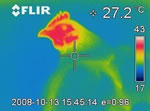Mother Hen Feels Chicks Distress
 Ever hear someone being called a mother hen for being worried and overprotective? That expression may turn out to be quite fitting as scientists have now discovered that a hen shows empathy if she saw her chicks in distress:
Ever hear someone being called a mother hen for being worried and overprotective? That expression may turn out to be quite fitting as scientists have now discovered that a hen shows empathy if she saw her chicks in distress:To simulate this stress, the researchers exposed hens and chicks to puffs of air (as from a keyboard-cleaning canister), causing the birds mild distress without harm or pain.
The hens, which were separated from the chicks but could see, smell and hear them, paid more attention to their surroundings when the puff of air was directed at them. But when it was directed at their chicks, the mama birds responded more intensely with a stress response equivalent to fight-or-flight behavior: The hens’ heart rates increased and their external temperatures changed (even though the chicks weren’t making distress calls, ruling out the possibility that this was a protective-mom response).
They also emitted a "maternal vocalization" call, which is used to call their chicks back to them, Edgar told LiveScience. "It also enhances memory formation of the chicks. Then they know what to do in these circumstances if it ever arises again," she said.
Primatologist Frans de Waal of Emory University, who wasn’t involved in the study, called the findings very interesting. "Not only is the mother hen emotionally affected, she also starts calling, which seems an ‘other-oriented’ response. She is trying to change the situation," de Waal said.
More:
The foundations of empathy are found in the chicken
Domestic chickens display signs of empathy, the ability to ''feel another's pain'' that is at the heart of compassion, a study has found. The discovery has important implications for the welfare of farm and laboratory animals, say researchers. Empathy, long thought to be a defining human trait, causes one individual to be affected by the emotional state of another.Feelings are ''mirrored'' in the observer, leading to a shared experience of being happy, sad or distressed. The research demonstrated that hens possess a fundamental capacity to empathise, at least with their own chicks. Scientists chose hens and chicks for the study because it is thought empathy probably evolved to aid parental care.
A number of controlled procedures were carried out which involved ruffling the feathers of chicks and mother hens with an air puff. When chicks were exposed to puffs of air, they showed signs of distress that were mirrored by their mothers. The hens' heart rate increased, their eye temperature lowered - a recognised stress sign - and they became increasingly alert. Levels of preening were reduced, and the hens made more clucking noises directed at their chicks.
Researcher Jo Edgar, from the School of Veterinary Sciences at the University of Bristol, said: ''The extent to which animals are affected by the distress of others is of high relevance to the welfare of farm and laboratory animals. Our research has addressed the fundamental question of whether birds have the capacity to show empathic responses. We found that adult female birds possess at least one of the essential underpinning attributes of 'empathy', the ability to be affected by, and share, the emotional state of another.''

No comments:
Post a Comment